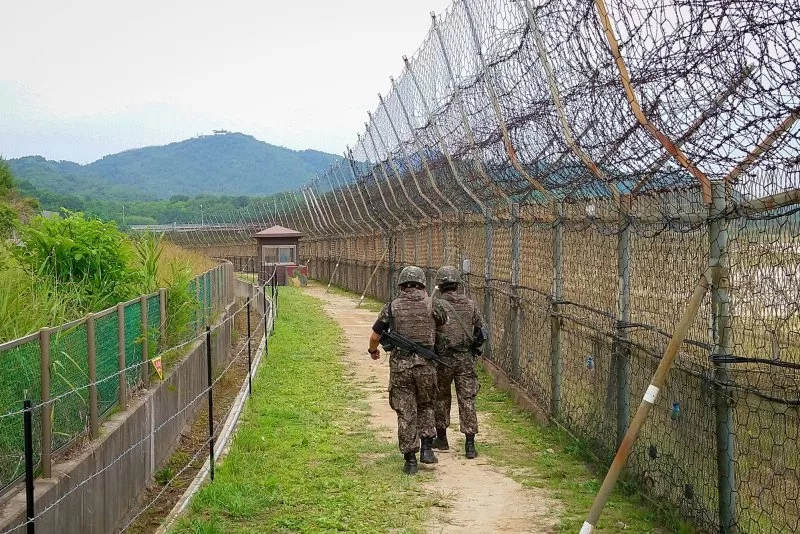Soldiers walk alongside a barbed-wire fence in Goseong, South Korea, in 2019. A group of North Korean escapees recently have been pushing for a change in U.S. policy toward North Korea in meetings with officials and policy experts in Washington, D.C., and New York. File Photo by Thomas Maresca/UPI |
License PhotoJuly 30 (UPI) — A group of young, professional North Korean escapees has been pushing for a change in U.S. policy toward North Korea in meetings with officials and policy experts in Washington, D.C., and New York.
Yesterday they met with Ambassador Robert Wood at the U.S. Mission to the United Nations and with members of the South Korean U.N. Mission. Last week they briefed staff at the National Security Council and the State Department’s Korea desk, as well as staffers from Florida Republican Sen. Marco Rubio‘s office.
They also spoke at public forums at the Hudson Institute and the National Endowment for Democracy and met with Northeast Asia experts at the Brookings Institution.
The group urged policymakers to give greater attention to North Korean human rights abuses and to expand access to information inside the tightly controlled nation.
In 2014, the U.N. Commission of Inquiry on Human Rights in North Korea found the regime guilty of crimes against humanity. The regime, under current leader Kim Jong Un, fears the free flow of information to its people and has imposed draconian laws against the distribution and accessing of international media, including even public executions.
Hyunseung Lee, a Fellow at the Global Peace Foundation and organizer of the group, said, “The international community must be more proactive in abolishing these cruel laws and improving human rights.”
He said that, while he was still in North Korea, three of his friends were sentenced to six months of hard labor for possessing foreign media.
Lee said that, for many North Koreans, outside information is like water for a thirsty man in a desert, and they will risk a lot to get it.
One of the group members, J.Y. Park, communicates with people living close to the border with China. She said they want to know more about the outside world and about aspects of the ruling Kim family history that are concealed in official propaganda.
Gumhyok Kim, a media commentator and adviser to the South Korean government, came from an elite family in Pyongyang. Growing up, he believed that North Korea was a paradise. When he went to study at a Chinese university, though, he had greater access to information on the Internet.
“I learned things I never knew about North Korea,” he said.
He and some fellow North Korean students began to study about freedom, democracy and human rights, and to research information about the South Korean economy.
“Through information, people can begin to live lives of dignity,” Kim said, adding that he wants North Koreans to learn about the success escapees like him now enjoy in a free society.
He also said that South Korean TV dramas have some effect but not enough to counteract the pervasive propaganda young people are subjected to at school and college. There was a need for information targeted at elite young North Koreans covering the topics he and his friends had researched in China, he said.
Harry Kim, a successful software engineer residing in Texas, wants North Koreans to know that almost all Americans and South Koreans own a car and a refrigerator since such a life is unimaginable to them.
Others, such as Sunghyuk An, a Fulbright scholar at Syracuse University, said he also wanted to see more information about the suffering of North Koreans, and he wanted that information spread across America and South Korea.
This was the second series of meetings and events undertaken by what the participants called the North Korean Young Leaders’ Assembly. Its goal is captured in the title of the forum hosted by the National Endowment for Democracy: Preparing a Democratic Future for North Korea: Next Generation Leadership.
The members of the group want to highlight the suffering of the North Korean people and to prepare themselves to make a contribution to North Korea’s future whenever change arrives.

